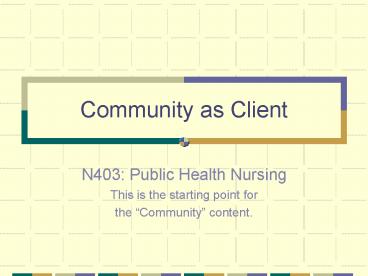Community as Client PowerPoint PPT Presentation
1 / 16
Title: Community as Client
1
Community as Client
- N403 Public Health Nursing
- This is the starting point for
- the Community content.
2
Community-Focused Nursing
- Community-focused nursing emphasizes applying the
nursing process with the community as the
client. - How does this new
client alter the
steps of nursing
process?
3
The community as client
- The community is considered the client only when
the nursing focus is on the collective or common
good instead of individual health. - Community-oriented practice seeks healthful
change for the whole communitys benefit. - Change for the benefit of the community client
often must occur at several levels, ranging from
the individual to society as a whole. - Nurses typically partner/collaborate with others
to improve the health of the whole community.
4
Learning the Lingo
- Group two or more people engaged in an
interdependent, purposeful relationship in which
repeated face-to-face communication occurs (your
community assessment team) - Aggregate collection of individuals who share
similar characteristics (nursing students, teen
mothers) - High risk aggregate because of lifestyle or
other shared characteristics, are at high risk
for illness, disability, or premature death
(migrant workers)
5
High risk aggregates
- Since, the characteristics that put these
individuals at risk are similar nursing
interventions can be planned for the total
aggregate, instead of planning for each separate
individual (mass blood pressure or osteoporosis
screenings, education on pesticides) - Target population identified aggregate in which
change is desired as the result of an intervention
6
Defining community
- Definitions of community vary according to the
situation and your purpose. - Communities may be defined in terms of
- Who (people factors)
- Where and when (time, place or space factors)
- Why and how (function)
7
Critical Attributes
- The three critical attributes or defining
characteristics of a community are - People
- Place
- Function, social interaction, common interests,
goals and characteristics
8
The people
- Population demographics age, sex, race,
socio-economics, rural/urban, dependents, number
and density - The number of people in a designated community
often depends on the other two critical
attributes. - The most obvious attribute?
- can you have a community
without people???
9
The place
- Traditionally, communities were described in
terms of geographic area. - The concept of population aggregates (i.e. the
elderly) have resulted in one of two
designations - Geopolitical a spatial designation or
geographic area (i.e. Fruita, Riverside,
Palisade) - Phenomenological a relational designation or a
feeling of belonging (i.e. MSC students, MADD)
members share a group perspective that
differentiates them from other groups.
10
Geopolitical communities
- How you define a communitys boundaries is up to
you, depending on what the situation and purpose.
You can use - Political boundaries city limits, county line
- Local or folk name for an area Riverside
- Size in square miles, acres, blocks or census
tracts - Transportation avenues highways, railroads,
sidewalks - Natural boundaries - rivers, mountains
- Physical characteristics land use patterns,
housing (farming community north of Fruita)
11
Community of solution
- Sometimes phenomenological communities are
created around similar issues, health problems,
or resources in order to reach a mutually
beneficial solution. - Consider the communities in Western Colorado
- who would need to address a hazardous materials
spill in the Colorado River? - who is reliant on St. Marys Airlife for response
to serious traumatic injuries?
12
Communities of solution
Glenwood Springs
Craig
Glenwood Springs
Rifle
GJ
Colo. River
GJ
Delta
All communities along the Colorado River Basin
have worked together on developing an organized
response plan for Haz-Mat spills.
Emergency response units in many small
communities work closely with St. Marys Airlife
to respond to traumatic injuries in the region.
13
The third critical attribute
Social interaction
Common interests
Socialization process Social control Adapting to
change Providing mutual assistance to group
members
Formal groups schools, churches, businesses,
agencies Informal groups service clubs,
friendship networks Linking structures
Characteristics
Goals
Producing goods services Why the community
exists
Demographics and other unique descriptors
These factors reflect the unique patterned
interaction among individuals, families, groups
and organizations.
14
Goals of communities
- In general, goals are focused on
- Maximizing the well-being of members
- Promoting survival of the community
- Meeting the needs of community members
- Specific goals are determined by the type of
community
15
Pause and think
- about two different types of communities you
are a member of - What are the critical attributes of each
community? - How many people are in your community?
- Is it a geopolitical or phenomenological
community? - What are the social interactions, common
interests, goals, characteristics of your
community? - What makes your community unique
from others? - Are there high risk aggregates within
your community?
16
Now what?
- Youve just completed part one of the Community
content. - Go on to Part 2 What is a healthy community?

